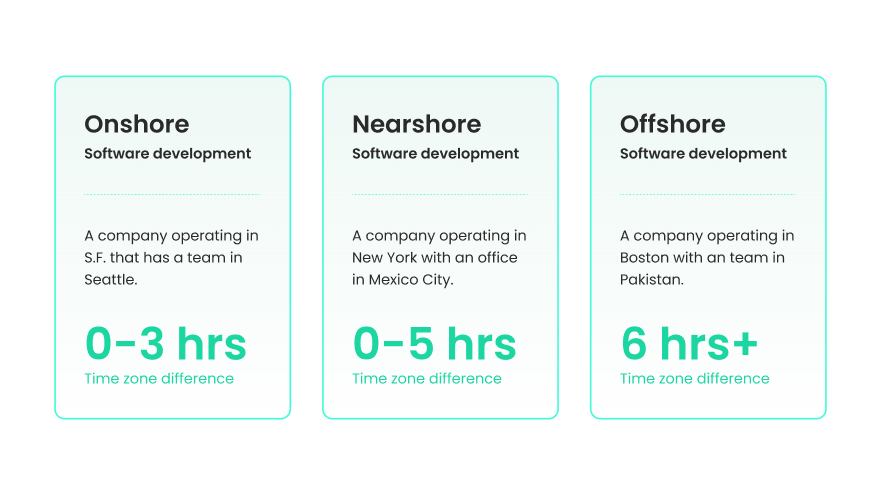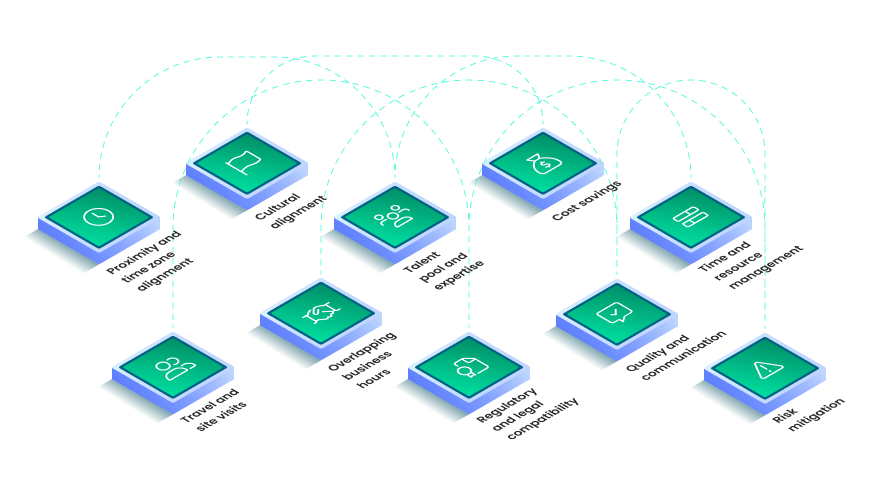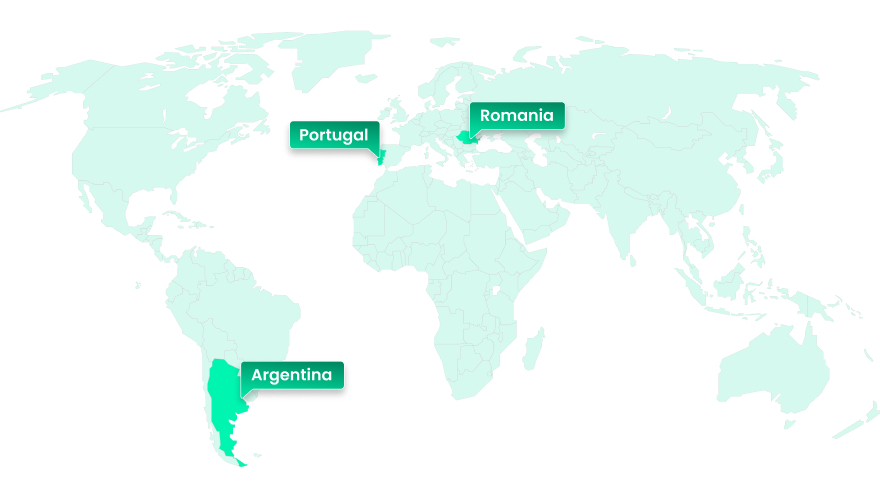Definition of "nearshore" and "nearshoring"
Let's start by establishing the nearshore definition. "Nearshore" refers to the practice of outsourcing or offshoring business processes or services to a company or team located in a country that is geographically close to the client's home country. A similar term is "nearshoring", which specifically refers to the practice of outsourcing or offshoring business processes or services to a country that is geographically close and culturally similar to the client's home country.

While nearshore outsourcing emphasizes the proximity of the outsourcing destination, nearshoring emphasizes geographical proximity and cultural affinity. Both terms refer to outsourcing to nearby countries, but nearshoring further highlights the importance of cultural similarities for effective collaboration and communication.
Nearshore software development
When talking of software development, nearshore refers to the practice of outsourcing software development projects to companies or teams located in neighbouring or nearby countries. It is a form of outsourcing that offers several advantages over traditional offshore outsourcing, where the work is sent to more distant locations.
In nearshore software development, the client company typically collaborates with a software development team located in a nearby country, often in the same time zone or a similar time zone. For example, a company based in the United States or Canada might work with a software development team in Argentina. Similarly, a European company might collaborate with a team in Portugal or Romania.
Advantages of nearshore software outsourcing

Nearshore software outsourcing offers several benefits for businesses. In this section, you can find some of the key advantages of nearshore software development.
Proximity and time zone alignment
Nearshore software development involves outsourcing to a neighbouring country or a nearby region with a similar or overlapping time zone. This proximity allows for easier communication, collaboration, and coordination between the client and the development team. It reduces the challenges associated with language barriers, cultural differences, and long-distance communication.
Cultural alignment
Nearshore development destinations often share cultural similarities, including language, work ethics, and business practices, with the client's country or region. This alignment fosters better understanding, smoother collaboration, and effective teamwork between the client and the nearshore development team. It enhances communication, reduces misunderstandings, and promotes a shared understanding of project goals and expectations.
Talent pool and expertise
Nearshore destinations often have a pool of highly skilled software developers who possess strong technical expertise and experience in the relevant technologies. These developers may have similar educational backgrounds and skill sets as developers in the client's country. Access to a diverse talent pool allows businesses to find qualified professionals who can meet their specific project requirements.
Cost savings
Nearshore software development can provide cost advantages compared to onshore development. While nearshore rates may be slightly lower than onshore rates, they are often higher than offshore rates due to the proximity and the higher cost of living in these regions. However, the cost savings in nearshore outsourcing can still be significant compared to hiring local developers, especially in countries with lower labour costs or favourable currency exchange rates.
Time and resource management
Nearshore outsourcing offers the advantage of having software developers working in a similar time zone. This enables real-time collaboration, quicker response times, and efficient resource management. It reduces the waiting time for communication and decision-making, allowing for faster development cycles and improved project efficiency.
Travel and site visits
Nearshore destinations are usually easily accessible for on-site visits and face-to-face meetings. This facilitates stronger relationships, enables direct communication, and enhances the client's involvement in the development process. Regular visits to the nearshore location can help build trust, foster better understanding, and strengthen the partnership between the client and the development team.
Overlapping business hours
Nearshore outsourcing often provides a significant overlap in business hours, making it easier to coordinate meetings, address issues, and maintain effective communication. This facilitates real-time collaboration and reduces delays caused by time zone differences, enabling smoother project execution and faster problem resolution.
Regulatory and legal compatibility
Nearshore destinations, particularly those in the same or nearby regions, often share regulatory frameworks, legal systems, and intellectual property protection standards. This promotes compliance with data protection laws, intellectual property rights, and contractual agreements, providing a higher level of legal compatibility and reducing legal complexities.
Quality and communication
Nearshore software development can offer a higher level of quality compared to offshore outsourcing. The cultural proximity and shared understanding foster effective communication, allowing for better requirements gathering, clearer project specifications, and improved collaboration throughout development. This leads to a higher likelihood of delivering high-quality software solutions.
Risk mitigation
Nearshore outsourcing provides a balance between cost savings and reduced risks compared to offshore outsourcing. The geographical proximity and cultural alignment help mitigate potential risks associated with communication challenges, quality control, project management, and overall project delivery. This reduces the potential for misunderstandings, enhances transparency, and minimizes the risks associated with offshore development.
Final considerations
Overall, nearshore software development offers a compelling combination of proximity, cultural alignment, talent availability, cost-effectiveness, and effective collaboration. It allows businesses to leverage the benefits of outsourcing while maintaining closer proximity and stronger communication channels, resulting in successful project outcomes.
Choosing a nearshore outsourcing provider

Choosing the right nearshore software development provider is a critical decision that can greatly impact the success of your project. Here are some key factors to consider when selecting a nearshore software development provider:
Expertise and experience
Assess the provider's expertise and experience in your specific industry and technology stack. Review their portfolio, case studies, and client testimonials to gauge their ability to deliver high-quality solutions. Look for evidence of successful projects similar to yours and its nearshore experience.
Technical skills and talent pool
Evaluate the technical skills and capabilities of the nearshore software development team. Consider their proficiency in relevant programming languages, frameworks, and tools. Assess the qualifications, certifications, and experience of their developers. Ensure that their talent pool aligns with your project requirements.
Communication and language skills
Effective communication is crucial for successful collaboration. Assess the nearshore provider's communication skills and proficiency in the language(s) you prefer to use. Clear communication channels and prompt responsiveness are essential for smooth project management.
Cultural fit and understanding
Consider the cultural fit and understanding between your organization and the nearshore provider. Evaluate their ability to adapt to your work culture, understand your business goals, and align with your values and expectations. Cultural affinity can foster better collaboration and minimize misunderstandings.
Time zone compatibility
Evaluate the time zone compatibility between your team and the nearshore development provider. Determine if their working hours overlap with yours sufficiently to enable real-time communication and collaboration. This ensures timely responses and avoids significant delays.
Quality assurance and processes
Inquire about the nearshore provider's quality assurance processes, methodologies, and practices. A robust quality assurance framework ensures that the delivered software meets your standards and requirements. Ask about their testing procedures, code reviews, and their approach to addressing bugs and issues.
Security and intellectual property protection
Discuss security measures and intellectual property protection policies with the nearshore provider. Ensure they have appropriate security protocols in place to safeguard your data and intellectual property. Understand their data handling practices and sign comprehensive non-disclosure and confidentiality agreements.
Scalability and flexibility
Consider the software development services provider's ability to scale up or down as per your project requirements. Assess their capacity to accommodate changes, additional resources, or new technologies. A flexible provider can adapt to your evolving needs and contribute to long-term success.
Cost considerations
While cost should not be the sole determining factor, evaluate the provider's pricing structure and overall cost-effectiveness. Compare their rates with competitors while considering the quality of their work, expertise, and the value they bring to your project.
References and Reputation
Seek references from the nearshore provider's previous clients. Reach out to those clients to gain insights into their experience and satisfaction. Additionally, research the provider's reputation through online reviews, forums, and industry networks.
Nearshore developers in Argentina, Portugal and Romania

At Share IT we are proud to offer nearshore software development services and provide highly skilled developers from our outsourcing development centres strategically located in Argentina, Portugal, and Romania. These countries have been carefully selected for their abundant talent and resources.
For clients based in North America, Argentina is an exceptional market for software development. With a large pool of skilled developers, Argentina offers a winning combination of technical expertise and cost-effectiveness. Our talented Argentinean developers are well-versed in the latest software development trends and possess a strong foundation in software development principles. They are proficient in English and share a cultural alignment with Western countries, ensuring smooth communication and collaboration with international clients.
For clients based in Europe, Portugal boasts a skilled workforce of software developers who excel in technical excellence and possess English proficiency. The country's proximity to major European cities allows for convenient travel and on-site visits, fostering stronger relationships and direct communication. Portugal's stable business environment and high-quality infrastructure make it an ideal nearshore outsourcing destination for software development projects.
Similarly, Romania has a strong reputation in the IT industry and serves as a valuable resource for nearshore development talent in Europe. The country is renowned for its highly skilled professionals who excel in various software development technologies. Romanian developers are known for their technical expertise and their ability to deliver high-quality solutions. With cost advantages compared to Western European countries, Romania offers an appealing proposition for businesses seeking skilled nearshore developers at competitive rates.
By leveraging our nearshore outsourcing centres in Argentina, Portugal, and Romania, our clients can tap into the unique strengths and benefits of these countries. Whether it's cost-effectiveness, technical expertise, cultural alignment, or proximity to major markets, Share IT ensures access to the right talent and resources tailored to specific software development needs. Our team of skilled nearshore developers is equipped to deliver top-notch solutions while providing seamless communication, collaboration, and reliable support throughout the project lifecycle.
Our conclusion
In conclusion, nearshore software development offers a range of advantages for businesses. By partnering with a nearby country for outsourcing their software development projects, companies can benefit from factors such as geographical proximity, cultural affinity, and time zone compatibility. These advantages facilitate effective communication, collaboration, and coordination, resulting in improved project management and faster response times. Additionally, nearshore destinations often provide access to a skilled talent pool at competitive rates, ensuring high-quality deliverables while maintaining cost efficiency. The ability to engage in face-to-face meetings, on-site visits, and closer relationships further strengthens the partnership and fosters a sense of trust and teamwork. Overall, nearshore software development presents an appealing option for businesses seeking a balance between cost-effectiveness and effective collaboration.
About us
Provider of software development services with offices in Toronto and Dublin, and development centres in Argentina, Portugal, and Romania. We provide software, web, and mobile development services to IT and Tech companies, IT teams, Marketing and Digital agencies and Marketing teams across Europe and North America.
Europe & North America
-
Argentina
If you operate in North America, our development centre in Argentina is an excellent location to benefit from a flexible, competitive, and scalable software development team based in a similar time zone.
-
Hybrid
If you need development teams across North America and Europe, we can offer you a hybrid software development environment from our development centres in Argentina, Portugal, and Romania.
-
Portugal & Romania
If you operate in Europe, our development centres in Portugal and Romania are great locations for you to benefit from flexible, competitive, and scalable software development teams based in similar time zones.

